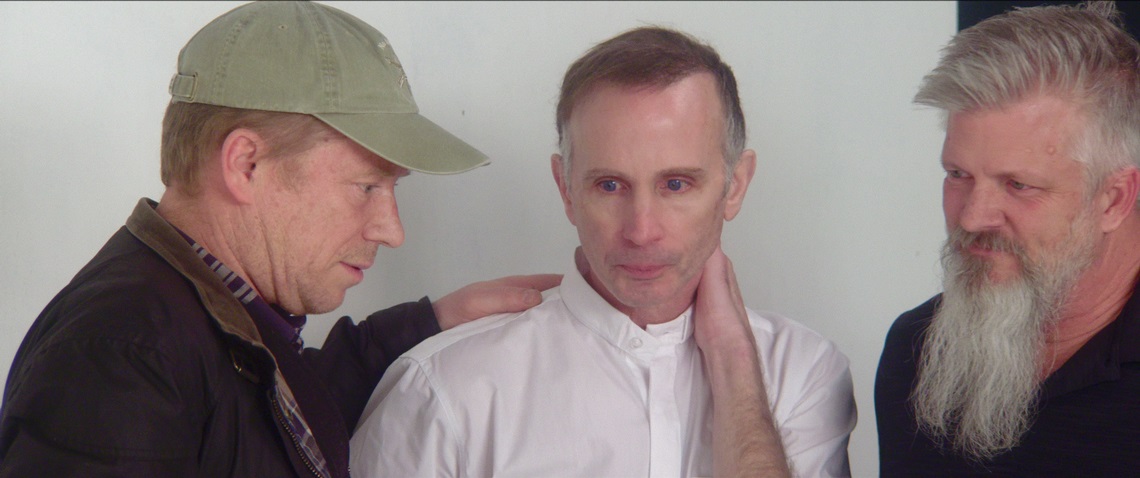KANSAS CITY (MO)
Kansas City Star [Kansas City MO]
October 5, 2022
By Judy L. Thomas
[Photo above: Ed Gavagan, Michael Sandridge and Dan Laurine in a scene from Procession, a documentary that follows six men, all survivors of childhood sexual abuse by Catholic priests and clergy, who come together to direct a drama therapy-inspired experiment designed to collectively work through their trauma – Courtesy of Netflix]
A former Kansas City priest and retired Wyoming bishop whose numerous sexual abuse allegations were dismissed by the Vatican but deemed credible by two current U.S. bishops is moving back to the metro area.
Joseph Hart, who left Kansas City more than four decades ago to become Bishop of Cheyenne, will be residing in a senior living facility, The Star has learned. Hart, who turned 91 last month, has a brother — also a priest — who lives in Kansas City.
One of Hart’s victims told The Star that he was contacted last week by Bishop James V. Johnston Jr., head of the Catholic Diocese of Kansas City-St. Joseph, to let him know Hart would be returning. Ashlie Hand, spokeswoman for the diocese, referred questions to the Diocese of Cheyenne.
“Since retired Bishop Hart (regardless of where he lives) reports to the current Bishop Biegler in Cheyenne, they are the best ones to answer…,” Hand said in an email. “The safety protocols that were established for Bishop Hart in the Diocese of Cheyenne and by the Vatican will remain in place here, in addition to engaging our own diocesan safety protocol process.”
Bishop Steven Biegler confirmed Hart’s relocation in a statement to The Star on Tuesday afternoon. “Bishop Joseph Hart made the decision to move to Kansas City, MO,” Biegler said. “He is free to decide to relocate and reside where he wishes. Nevertheless, he is to observe certain limitations in his social interaction because Pope Francis imposed upon Bishop Hart the prohibition that he refrain from any contact with minors, youth, seminarians, and vulnerable adults and from presiding or participating anywhere in any public celebration of the Liturgy.”
Biegler said the Cheyenne diocese is responsible for ensuring that a retired bishop “is provided with proper sustenance, which includes his essential needs (food, shelter, and medical care).”
“Bishop Hart’s sustenance will be met by the monthly stipend that he receives from the priests’ retirement pension, based on his years of ministry, and by supplemental funding from the Diocese of Cheyenne to cover the financial needs associated with his sustenance,” Biegler said.
“Finally, I am in the process of contacting the survivors who brought allegations of sexual abuse against Bishop Hart. I continue to pray for the survivors, their family members, Bishop Hart, and all who are affected by sexual abuse.”
News of the move incensed victims of sexual abuse by priests in the Kansas City-St. Joseph diocese.
“All the survivors deal with this every day of their lives,” said Michael Sandridge, a victim of another credibly accused priest in the diocese and one of six men featured in “Procession,” a highly acclaimed Netflix documentary about priest sex abuse.
“His coming back is a slap in the face for all his victims. There are several other options available. Send him to the Vatican and let them deal with him. They are responsible for that monster — not the parishioners of Kansas City.”
Sandridge said he received an email Friday from Jennifer Prusa, director of Journey to Bethany, a diocesan initiative in Kansas City created to help clergy sexual abuse victims heal.
“You may already know that Joseph Hart is relocating to Kansas City,” Prusa wrote. “Bishop Johnston has spoken personally to Hart’s victims here and is talking with Bishop Biegler in Wyoming… If you think anyone else in the film or any other survivors you know would like to understand more about this move and the plans in place, I’d welcome a connection with them.”
On Monday, Prusa responded to Sandridge’s followup questions asking for more information about Hart’s relocation.
“He is moving this week and will reside in a senior citizen facility,” she wrote. She offered to help get Sandridge in touch with diocesan leadership “so that you can ask questions directly.”
“I understand your curiosity about Bishop’s calls to the survivors in our area,” Prusa wrote. “We considered whether or not a call from him would be triggering for the survivors and decided that it was important that they knew that he personally understands the effect Hart’s move could have for them. He is a very good listener and good at sitting with survivors, in other words, the calls were meant to be both informative and pastoral.”

Johnston serves as chairman of the U.S. Conference of Catholic Bishops’ Committee on the Protection of Children and Young People.
Ed Gavagan, another abuse survivor featured in “Procession” and the man whose allegations against Hart led to criminal investigations in Wyoming, said the retired bishop doesn’t deserve to live in comfort.
“To me, he should be a pariah and in a cellblock, so any accommodations beyond that are not only an insult, they are a disgrace,” said Gavagan, now a New York City contractor. “Someone in these institutions needs to follow through and do the right thing, from the Vatican, to the police department and the district attorneys of two states. There needs to be some accountability.”
Joe Eldred, a victim of three other priests in the diocese in the 1980s who also is featured in “Procession,” said Hart’s return could re-traumatize abuse victims.
“Why should Kansas City welcome back this child molester who has not taken any accountability for the harm he caused?” said Eldred, who lives in southwest Missouri. “Bishop Hart has been credibly accused of sexually abusing many boys and as an abuse survivor myself, I know that his very presence in Kansas City will rip open barely healed wounds.
“Bishop Hart’s victims deserve his criminal accountability and the backing of the diocese that failed them in such a heinous way as children. Turn up the heat and do not welcome him back. Protect the children and support his victims. Kansas City deserves better.”
DIOCESE CHANGED STANCE ON ALLEGATIONS
Hart was a priest in the Roman Catholic Diocese of Kansas City-St. Joseph from 1956 to 1976, then served as auxiliary bishop of Cheyenne from 1976 to 1978 and bishop from 1978 until retiring in 2001.
Allegations against Hart first surfaced in 1989 and 1992 in Kansas City. Diocesan officials originally deemed those allegations not credible, but in 2018, Bishop Johnston found them to be substantiated.
In 2002, Gavagan, who grew up in Wyoming, accused Hart of sexually abusing him as a boy. Authorities in Cheyenne concluded there was no evidence to support the allegations. But in July 2018, Biegler — then the new Bishop of Cheyenne — announced that the diocese had reopened its investigation into Hart. Biegler said the previous investigation was flawed and said a second man had come forward alleging sexual abuse by Hart.
Both men’s allegations, Biegler said, had now been deemed “credible and substantiated.”
Wyoming authorities, spurred by the Cheyenne diocese, opened a new investigation. If charged, Hart would have become the highest-ranking Roman Catholic cleric in the country to face criminal prosecution for sexual abuse of a minor. Though the alleged abuse occurred decades earlier, Wyoming — unlike most states — has no statute of limitations for criminal prosecutions, so charges can be filed years later.
By September 2019, the Diocese of Cheyenne said it had received six credible allegations against Hart. And the Kansas City-St. Joseph Diocese, which in 2008 and 2014 had settled two lawsuits for $10 million each in cases involving numerous priests and dozens of victims — including 10 who alleged abuse by Hart — said it had received four additional allegations against Hart in the past year.
The Cheyenne Police Department recommended that Hart be charged. But a special prosecutor assigned to the case declined to file charges in 2020, citing insufficient evidence.
And though both Biegler and Johnston have deemed the allegations against Hart to be credible, the Vatican last year cleared him of seven accusations that he sexually abused minors and said five others could not be proven “with moral certitude.”
The accusations involved 11 males and one female. Moral certitude is held to be equivalent to “beyond a reasonable doubt,” the standard of proof required for a criminal conviction. Two other cases that involved boys who were 16 and 17 could not be prosecuted, the Vatican said in its decree, because the church didn’t consider them minors, and another allegation was not addressed.
But the Congregation for the Doctrine of the Faith also issued a canonical rebuke to Hart “for his flagrant lack of prudence as a priest and bishop for being alone with minors in his private residence and on various trips, which could have been potential occasions endangering the ‘obligation to observe continence’ and that would ‘give rise to scandal among the faithful,’” according to a statement from the Diocese of Cheyenne.
The Congregation for the Doctrine of the Faith reminded Hart that restrictions placed upon him by Pope Francis in October 2018 remained in force. Those restrictions prohibited Hart from having “any contact with minors, youth, seminarians and vulnerable adults” and from “presiding or participating anywhere in any public celebration of the Liturgy.”
Last month, the Cheyenne diocese showed “Procession” to Catholics in three Wyoming towns, followed by a Q&A session with three of the men in the film — Gavagan, Sandridge and Dan Laurine, who also is from the Kansas City area.
One scene in the film recreates an incident of Hart’s abuse of Gavagan.
“Hart must be receiving negative pressure, and I wonder if his leaving Cheyenne is even his idea,” Eldred said Monday. “Now that his evil truth of his actions has been made public, he slinks off to re-enter his old hunting grounds.”

